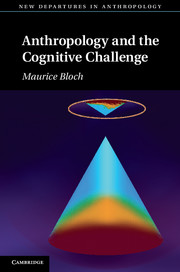Book contents
- Frontmatter
- Contents
- Acknowledgements
- 1 Why anthropologists cannot avoid cognitive issues and what they gain from these
- 2 Innateness and social scientists' fears
- 3 How anthropology abandoned a naturalist epistemology: a cognitive perspective on the history of anthropology
- 4 The nature/culture wars
- 5 Time and the anthropologists
- 6 Reconciling social science and cognitive science notions of the ‘self ’
- 7 What goes without saying
- 8 Memory
- References
- Index
1 - Why anthropologists cannot avoid cognitive issues and what they gain from these
Published online by Cambridge University Press: 05 August 2012
- Frontmatter
- Contents
- Acknowledgements
- 1 Why anthropologists cannot avoid cognitive issues and what they gain from these
- 2 Innateness and social scientists' fears
- 3 How anthropology abandoned a naturalist epistemology: a cognitive perspective on the history of anthropology
- 4 The nature/culture wars
- 5 Time and the anthropologists
- 6 Reconciling social science and cognitive science notions of the ‘self ’
- 7 What goes without saying
- 8 Memory
- References
- Index
Summary
Social and natural scientists have come to hate each other. They cannot understand each other's purpose. They consider each other's methods either sloppy or dangerous. They are repulsed by each other's style and mode of presentation. They even dress differently. They often come from different social and educational backgrounds. Yet it was not always so and what follows will show this need not be so in the future though the antipathy is not a simple matter of misunderstanding. It goes very deep.
This book attempts reconciliation, focussing on those benefits which some social scientists, especially anthropologists, can derive from taking into account the work of cognitive scientists for the kind of issues which are central to their disciplines. It starts by explaining the historical and philosophical root of the divorce between the two types of studies and how misleading this has been. But the central purpose will be to demonstrate that cognitive issues are not on the periphery of such social sciences as anthropology, history or sociology. Instead, it will be to show that they are relevant and helpful for the most central and familiar topics which, among others, cultural and social anthropologists deal with. Of course, natural scientists and especially cognitive scientists would also greatly benefit from a deeper understanding of what the social sciences have to say but this would be the subject of another book.
- Type
- Chapter
- Information
- Anthropology and the Cognitive Challenge , pp. 1 - 13Publisher: Cambridge University PressPrint publication year: 2012

